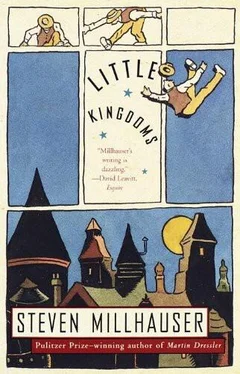THE MARGRAVE. What of the margrave? The tales say little of the Prince’s friend, save that each night he lay faithfully on his side of the sword. It is true that in one version he becomes the Princess’s lover, and they are caught there, in the bed; but this is a version that few of us heed, for we recognize it to be less daring than the versions in which the Princess remains unsullied in the margrave’s bed. Let us say, then, that the margrave remains nightly on his side of the sword. What is he thinking? We may imagine that he is troubled by the visits of the Princess, who nightly creeps into his bed and lies beside him without a word. We do not disgrace him if we imagine that he desires the Princess, for he is a man like other men and the Princess is the fairest of all women; but even if we fail to take into account his own sense of honor, the margrave is bound to the Prince by the high law of friendship, and by the debt that every guest owes to his host: he would no more think of possessing the Prince’s wife than he would think of stealing a silver spoon. Or, to be more precise: he is forced, by the Princess’s offer of herself, to think continually of possessing her, and the thought so inflames and shames him that he must exercise all his vigilance to resist the nightly test, while at the same time he must make certain not to offend the Princess by an unseemly coldness. It is also possible that the margrave senses that the Princess has been sent by the Prince against her will, to test him; if so, the knowledge can only strengthen his resistance, while making him question why he has incurred the Prince’s suspicion. The margrave is troubled by the displeasure he senses in the Prince, and by the cooling of their warm friendship; he longs to return to the early days of his visit. It is time for him to return to his distant land, but he cannot make up his mind to leave the castle. Is he perhaps drawn to the nightly test, the nightly overcoming of his desire, by which act alone he can assert the power of his high nature? Or is he perhaps secretly drawn to the possibility of a great fall? Thus do we weave tales within tales, within our minds, when the tales themselves do not speak.
RATS. The rats in our town scuttle along the narrow lanes, crawl from the compost heaps before our houses, scamper freely in the grassy ditch between the double ring of walls. They feed on slops surreptitiously spilled in the streets despite our strict ordinances, on scraps from the dinner table, on carcasses brought for burial to the field beyond the gates. The ratcatcher drowns the rats in the river, and it is from the seed of these drowning rats that a darker breed of rat is said to grow. The dark rats swim across the river and burrow in the cliff hollows. Slowly they make their way up to the castle. They penetrate the towers of the outer and inner walls, scamper across the courtyards, invade the larder and the pantry, and gradually make their way down to the underground cells and tunnels. From there they begin their long descent, pushing their sleek bodies through hidden fissures, seeping into the stone like black water, until at last they come to the dungeon. The dungeon rats are long haired, half-blind, and smell of the river. They crouch in the black corners, rub against the damp walls, stumble against an outstretched foot. The prisoner can hear them cracking bits of stale bread, feeding on pools of urine. When he falls asleep the rats approach slowly, scurrying away only when he stirs. If the prisoner sleeps for more than a few minutes, he will feel the rats nibbling at his legs.
THE PRINCESS DECLINES. Scorned and distrusted by the Prince, eluded by the margrave, who no longer sought her company by day, thrown always into closer communion with the dwarf, the Princess began to mistrust herself, and to question her own mind. Always she lay awake at night, on her side of the margrave’s sword; and she spent her sunlight hours in a melancholy daze. Weary with sorrow, weak with night-wakefulness, she was yet ravaged with restlessness, and could scarcely sit still. Alone she walked in the green shadows of her garden, or wandered alone in the shady paths of the park; and though her gaze was fixed in an unseeing stare, often she would start, as if she had heard a voice at her ear. She ate little and grew thin, so that her chin looked bony and sharp; and in her wasting face her melancholy eyes grew large, and glowed with the dark light of sorrow. One morning she stumbled in her garden, and would have fallen had the dwarf not sprung from behind a privet hedge and helped to steady her; she felt a warmth on her neck and cheeks, and that afternoon she took to bed with a fever. In her fever-bed she had a vision or dream: she saw a girl at a well, holding a golden ball. The girl dropped the ball, which cracked in two, and from the ball a black raven flew forth and circled round her head, trying to peck out her eyes. And though the girl cried out, the bird put out her eyes; and from the drops of blood that fell to the ground, a thornbush grew. And when the wings of the raven brushed the thorns, instantly the bird died, and the girl’s sight was restored. Then the Princess woke from her fever-dream and asked the dwarf what it portended. The dwarf replied that the golden ball was her past happiness, and the margrave the raven, that had ended her happiness; and the thornbush was her sorrow, from whence would come her cure. For there was a cure, but it must come from her own despair. Thus did the dwarf tend the Princess in her sickbed, bringing her goblets of cool water, and telling her dwarf tales, as though she were a child; and always he watched her closely with his brown, melancholy, slightly moist, very intelligent eyes.
OTHER TALES. The tales of the Princess are part of a larger cycle of castle tales; other tales speak of the Prince’s daughter, the contest of archers, the Prince and the Red Knight. These are tales of the castle, but we have other tales as well: the tale of the Black Ship, the tale of the three skeletons under the alder tree, the tale of the raven, the dog, and the piece of gold. As children our heads are full of these tales, which we confuse with real things; as we grow older our minds turn to affairs of this world, and to the promise of the world hereafter. But the old tales of our childhood never leave us entirely; in later years we pass them on to our own children, without knowing why. Sometimes when we grow old the tales return to us so vividly that we become caught in their wonder, like little children, and forget the cares of the moment in a kind of drowsiness of dreaming; then we look up guiltily, as if we have done something of which we are ashamed.
OUTBURST. Day after day the Princess lay feverish in her sickbed, attended by the dwarf, who sat beside her on a high stool, held cool water to her lips, and fed her syrups prescribed by the court physician; and bending close to her ear, he urged her to confess to the Prince that the margrave had wronged him. Could she be certain, could she be absolutely certain, that the margrave, who after all possessed a fiery nature, had approached her only in friendship? Had she seen no sign of a more ardent feeling? Could she say, in all truthfulness, that relations between her and the margrave had been entirely innocent? When she looked deep into her heart — and he urged her to look deep, deep into her heart, deeper than ever into that unfathomable darkness where perhaps only a dwarf’s eyes could see clearly — when she thus looked into her innermost heart, could she say, in all conscience, that she did not desire the attentions of the margrave? Certainly he was a handsome man, well knit and hard muscled, and in all ways deserving of love, so that it must be difficult, for a woman, not to dream of being kissed by those lips, embraced by those graceful, powerful arms. Could she say, in all honesty, that she had not in some small way, if only by a smile or a look, encouraged in the Prince’s friend, who was also, as all the court knew, her intimate friend, some slight bending of his mind toward her, some barely perceptible swerve from the straight line of innocent friendship? And was not friendship itself, truly understood, a passion? Could she, when she looked into the darkness of her heart, deny that she had seen her friendship-passion take on a new and unexpected shape, there in the all-transforming and all-revealing dark? Far be it from him to suggest the slightest degree of deviation from the path of wifely duty — although, in such matters, precise lines were difficult, nay, impossible, to draw. And could she say, in all earnestness, that never once, in the margrave’s bedchamber, had the tip of his finger grazed her loosened hair, never once, in all those nights, had he looked on her otherwise than in the purity of an unlikely child-friendship? For surely the ardent margrave had been tempted — to deny it would be to insult him, and indeed to insult the Princess herself, whom all women envied. But where there is temptation, there is the first motion toward a fall. Therefore to say that the margrave desired her was but to speak the truth; and for her to say to the Prince that the margrave had acted on his desire was no more than an extension of the truth, as heavy gold is beaten into airy foil. Thus did the dwarf whisper, as the Princess lay on her fever-bed, thus did he teach her to see in the dark; till looking into the darkness of her heart, the Princess saw disturbing shapes, and cried out in anguish. Then she bade the dwarf bring the Prince to her sickbed. And when the Prince appeared before her, the Princess cried out that the margrave had treacherously desired her, and whispered lewdly to her, and lain with her, and touched her lasciviously by day and by night; and for the sake of her lord, she confessed it. Then the Princess fell back, shuddering, and cried out that she was being stung by devils, so that she had to be restrained. Then the Prince summoned his guards, who seized the margrave in his chamber; and when he demanded to know what was charged against him, they would not answer him.
Читать дальше












